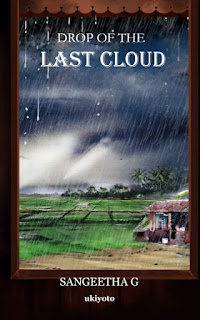Book Review: Drop of the Last Cloud
Once upon a time...there were decision-makers
It's certainly common enough to hear, speak and discuss about 'agency', 'consent', 'control over our bodies', 'privilege', 'patriarchy' and so on. But how many of us are able to apply these concepts in this day and age?
With every generation some challenges stay constant, despite the overall atmosphere build up that 'change is here'. Is the change good though? And, what change are we talking about? Does it signal progress or a backslide? The dialogue continues.
Now, imagine this scenario being discussed amongst the Nair women of Kakasherry Tharvadu (ancestral house) in Manjoor village, nearly 100 years ago. In her debut novel, Drop of the Last Cloud, Sangeetha G focuses on the lives and times of the Kakasherry women, who were at the cusp of social and political transformation, that took place in pre-independent India.
The novel opens to 1924, when floods ravaged Kerala and the birth of Gomathi, the protagonist of Drop of the Last Cloud. Gomathi's birth is considered inauspicious; the astrologers have come to the conclusion that 'she will break up the family'. Soon after Narayani, her mother, keeps her distance from Gomathi, and later, in an exception to the then prevalent practise, Gomathi is sent off to her father's house. In modern parlance we ought to add that Gomathi was sent to her biological father's place. Nair women had the right to take on partners, enter into sambandham (informal marriage system). They stayed on in their maternal homes, and did not set up homes with their partner in his house.
Gomathi's being sent away from Kakasherry Tharvadu was the first seed of conflict sown in her life. She had to battle many a questions; Why did her mother not like her? Should she be a 'good, demure' girl like the patriarchy demanded or assert her rights?; Should she choose her partner or go by her paternal grandmother's wishes? Should she choose her love and be happy or take society's diktat's in consideration? The decisions she took sent her life on another trajectory, leaving her disappointed and bitter. This bitterness spilled into the life of the people she comes in touch with -- her husband, Govindan, her love Madhavan and her children, especially her oldest girl, Madhavi.
Gomathi's character is someone who is not sure how to take charge of her life in the transformative years that she finds herself in; her aunt, Parvathy chittha, is symbol of those people who are open to new ideas, treating everyone humanely, not allowing deep-seated caste prejudices to colour her interactions; and then there is Madhavi, who could have been a replica of her mother, Gomathi. Instead she becomes independent, gets a job and decides to marry someone of her choice. Education and economically independent in modern times, just like her grandaunt Parvathy was in the bygone era.
Do men have a role in Drop of the Last Cloud? They do. And one can't help but be sympathetic to the plight of Govindan, who grew up with his own set of complexes, but tries to do the right by everybody, even his estranged wife Gomathi.
Sangeetha, a journalist, while weaving together the stories of Gomathi, Govindan, Madhavan, provides us with the wide arching background -- of the British policies, Independence movement, Second World War, rise of Communism, labour rights and the reform movements taking place. The ever evolving socio-political factors strive to pull the main characters in different directions. The characters struggle, try to fight their fate, find their place in a new world order and in the bargain lay the foundation of the Kerala state that we know today.
Name: Drop of the Last Cloud
Author: Sangeetha G
Publisher: Ukiyoto Publishing
Pages: 237
Price: Rs 320

Comments
Post a Comment